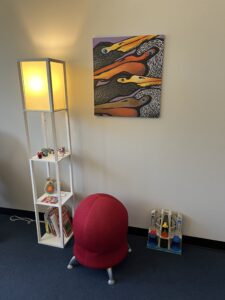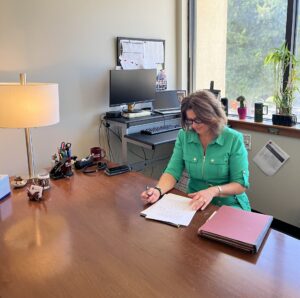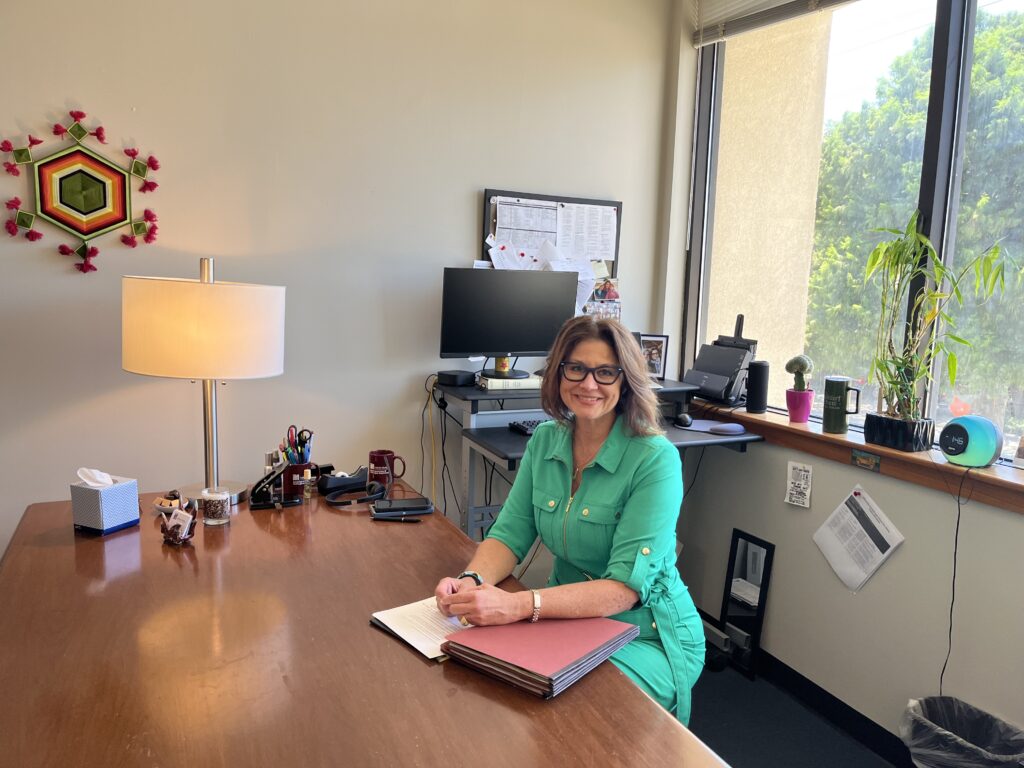Raquel Fonte is an attorney providing legal representation through the Acacia Center for Justice’s unaccompanied children program, which provides robust legal defense to children in immigration proceedings. We spoke with Raquel on her experience serving clients in Louisiana, and what motivates her to continue in the field.
How did you decide to become an immigration attorney?
I went to law school in Washington DC. I was interested in being near the center of things, where policies are made. I worked with a family law clinic in my law school, around the time that the Violence Against Women Act was being considered. Because of my Spanish-language skills, I was assigned to work with survivors of domestic violence who also had immigration issues and challenges. Abusers were hanging their partner’s lack of immigration status over their head as a way to keep them trapped in these abusive relationships. That was my first exposure to immigration work, and I became really interested in the intersection of immigration law and family law.
I also did an internship at Ayuda that got me deeper into the immigration and policy work. I was very interested in the possibility of effecting change through policy. But it was after law school that I really got into the trenches and decided to do direct service, which I’ve always come back to. I switched coasts after law school, and I got involved with CARECEN in Los Angeles. The 1996 Immigration Reform, one of the worst immigration reforms, had just been passed, so it was very challenging.
At CARECEN, we were doing advocacy work to serve the Central American community. I went back to Washington, DC to meet with Congressional staff and advocate on behalf of Central Americans for what ultimately became the NACARA, the Nicaraguan Adjustment and Central American Relief Act, which carved out some protections for this community that had been here for some time fleeing horrible civil wars and strife.
 What does a typical day look like for you?
What does a typical day look like for you?
The majority of cases that I handle are Special Immigrant Juvenile (SIJ) cases: I spend a lot of time drafting the petition, drafting memorandum, supporting documents, preparing declarations or affidavits from family members if the client is younger than a teenager. I also handle asylum cases, and occasionally other areas of immigration practice when I have the opportunity to so I can keep up to speed.
We collaborate a great deal with social services. For example, somebody could have difficulty getting enrolled in school, if they’re new arrivals and have the challenge of navigating the system here. One of the documents that we like to provide in our SIJ cases is proof of school enrollment. There have been a lot of changes in the school system here, where schools are closing down and some are merging. So even if you’re not a newcomer, it can be challenging to navigate. It’s great that we can collaborate with the social services team and get them to support clients with that process.
How do you defend unaccompanied children?
I assist them through every part of the SIJ process except the actual hearing. My license is in California and Maryland; most of our attorneys here have a Louisiana bar license. I do the writing of the petitions and all of the supporting documents, and then I work with my colleagues to collaborate in preparing for the actual hearing; that’s a great learning experience for me. I take over the case once we get the SIJ findings and handle the petition, the adjustment, and any immigration court that’s involved.
Another way to defend my clients would be empowering them to defend and help themselves. Particularly with teenage clients, I like to give them tools and information; for example, making sure they take responsibility for figuring out if they have an immigration court hearing coming up. That’s what they learn to do early on, to start to navigate some of the systems here that they will need to; showing people how to advocate for themselves. And that’s also a life skill.
 It’s amazing that you’re able to collaborate so closely with attorneys and your clients.
It’s amazing that you’re able to collaborate so closely with attorneys and your clients.
I really appreciate the collaboration and support of Acacia’s model, because I have worked at organizations or offices that don’t have that type of support. And then sometimes— like in asylum cases—you’re scrambling to find somebody to get a psychological analysis or report to support why the client might not be able to testify to a particular situation that was traumatic, or why their memories are suppressed and they have a difficult time retelling that story. Here, that’s at our fingertips, and that’s really valuable.
What are some of the biggest challenges that you’ve observed in your clients’ cases?
One of the biggest challenges is preparing for an asylum interview or an asylum hearing, where usually you are working with clients who have been severely traumatized. The timing is very challenging because often the date of the interview or the hearing could be years after the person is first in your office and telling their story. In some cases, that’s an advantage because with maturity, counseling, and support, you might be better able to articulate your story. But in some cases, the person has moved on and they’ve healed, and then you’re asking them to revisit that really traumatic moment in their lives and then tell it to a stranger. That’s one of the more challenging parts of practice, and of working with children as well.
But sometimes the challenges could be basic logistical challenges, like transportation. One of the most common reasons that people don’t make it to intake appointments is transportation. Many newcomers have a lot of difficulty getting drivers licenses here. The cost of an Uber or transportation can be very expensive, and New Orleans is not exactly a city known for its public transportation. The streetcar is charming, but that’s not how you can get to our office. We serve people from as far as Baton Rouge; the drive is well over an hour in many cases.
During the pandemic, we did try doing interviews and intakes virtually, but the truth is, it’s a disservice for this particular type of meeting to try to do that on a screen or on the phone. It’s much more of an advantage to have the person here, in person, given the nature of what you’re talking about.
 What are the biggest barriers you’ve witnessed to seeking asylum?
What are the biggest barriers you’ve witnessed to seeking asylum?
I initially practiced in California. California is in the 9th Circuit, and Louisiana is in the 5th Circuit. So the case law alone is not as friendly for asylum seekers in the 5th Circuit as it is in the 9th Circuit. One of the consequences is that I need to check my own expectations and manage my clients expectations as well. We have the opportunity through Acacia to access these wonderful national asylum trainings, where we hear from advocates that are coming up with these really creative arguments, like climate change asylum cases, for example.
That’s sort of the reality check that we need to do; it goes back to managing our expectations and the clients’ and letting them know, “This is a legitimate claim. It’s a serious claim, but is this one in which we might realistically prevail?”
Another challenge is timing. When we file an asylum application with the local asylum office or with immigration court, I always tell my clients, “no tengo el globo mágico” – I don’t have a magic ball to say how long it’s going to take for us to go to court, or to our interview, to tell their story. In the meantime, they’re going to be in limbo. The silver lining is that the cases are taking so long to adjudicate that, at least in the meantime, some of our clients as they get older can get a work permit to secure employment and have access to a form of identification.
 How are you able to recharge, and how have you continued to be able to stay in the movement?
How are you able to recharge, and how have you continued to be able to stay in the movement?
I’m a big advocate of taking sabbaticals in life, and I have had a few breaks. I had been working at Public Counsel in Los Angeles for several years when an opportunity came up for me to work as a professor at the immigration law clinic at USC. Some people wouldn’t really call that a break, but it was a change in the type of work that I did. In that clinic, I was supervising law students representing people in immigration court, and I also taught the clinical education class, so that was a nice shift.
I would say the people that I work with are as important to me as the work that we do, and we all really care about what we do. If I have a rough day, I can go to my colleagues’ office down the hall and say, “Hey, this happened.” Sometimes you think you’ve seen it all, I’ve seen all of these horrific things that a human being can do to another person, and then you see something, you hear another story, and it’s really appalling. I hold it together in front of the client and then later that day, I can take a pause and I know that my colleague understands what I’m talking about and can be empathetic and supportive.
Another time, a client of mine was killed here, in Metairie, and the parents came here to tell me about it. I got a heads-up that they were coming to speak with me, so I had the conversation with them and asked them how we can be supportive. After, I walked over to social services and just started crying. And they were there to support me through that. I think working in an environment that is supportive is really valuable, and in our office, I feel very supported.
 What inspires you to continue this work?
What inspires you to continue this work?
Even though it’s really challenging, it’s exciting to see your clients go through this process and come out stronger, more educated, more empowered. That gives me a lot of joy and it keeps me coming back. With policy work I thought I could have an impact making these big sweeping changes, but I actually prefer to be working with people on a case by case basis. The possibility that you can impact somebody’s life that way—that’s what keeps me coming back.
What advice would you share with anyone considering a career in immigration?
On a very practical level, I would suggest working directly with an agency or organization or office that does the work that you think you want to do. It could be through an internship, or working in your law school clinic. Do you want to get into the trenches and work individually with clients, or are you somebody who wants to work in policy, such as at a think tank? Go out and get some practical hands-on experience, and also talk to people in the field and see if they’re your kind of people. What I enjoy about my work, in addition to the day-to-day and the actual work itself, is having things in common with my colleagues and peers.
